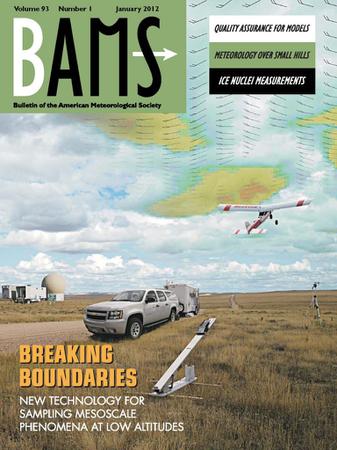Sublimation of Snow
IF 5.9
1区 地球科学
Q1 METEOROLOGY & ATMOSPHERIC SCIENCES
引用次数: 0
Abstract
Abstract Snow is a vital part of water resources, and sublimation may remove 10% to 90% of snowfall from the system. To improve our understanding of the physics that govern sublimation rates, as well as how those rates might change with the climate, we deployed an array of four towers with over 100 instruments from NCAR’s Integrated Surface Flux System from November 2022 to June 2023 in the East River Watershed, Colorado, in conjunction with the U.S. Department of Energy’s Surface Atmosphere Integrated Field Laboratory (SAIL) and the National Oceanic and Atmospheric Administration (NOAA)’s Study of Precipitation, the Lower Atmosphere and Surface for Hydrometeorology (SPLASH) campaigns. Mass balance observations, snow pits, particle flux sensors, and terrestrial lidar scans of the evolving snowfield demonstrated how blowing snow influences sublimation rates, which we quantified with latent heat fluxes measured by eddy covariance systems at heights 1 to 20 m above the snow surface. Detailed temperature profiles at finer resolutions highlighted the role of the stable boundary layer. Four-stream radiometers indicated the important role of changing albedo in the energy balance and its relationship to water vapor losses. Collectively, these observations span scales from seconds to seasons, from boundary layer turbulence to valley-circulation to mesoscale meteorology. We describe the field campaign, highlights in the observations, and outreach and education products we are creating to facilitate cross-disciplinary dialogue and convey relevant findings to those seeking to better understand Colorado River snow and streamflow.雪的升华
摘要 雪是水资源的重要组成部分,而升华可能会从系统中带走 10%到 90% 的降雪。为了更好地了解控制升华率的物理学原理以及升华率如何随着气候的变化而变化,2022 年 11 月至 2023 年 6 月期间,我们在科罗拉多州东河流域与美国能源部地表大气综合野外实验室(SAIL)和美国国家航空航天研究所(NCAR)的综合地表通量系统(Integrated Surface Flux System)合作,部署了一个由四个塔组成的阵列,并安装了 100 多台仪器。美国能源部地表大气综合野外实验室(SAIL)和美国国家海洋和大气管理局(NOAA)的降水、低层大气和地表水文气象研究(SPLASH)活动。质量平衡观测、雪坑、颗粒通量传感器和地面激光雷达对不断变化的雪场的扫描显示了吹雪是如何影响升华率的,我们利用涡度协方差系统在距雪面 1 到 20 米的高度测量的潜热通量对升华率进行了量化。分辨率更高的详细温度曲线突出了稳定边界层的作用。四流辐射计显示了反照率变化在能量平衡中的重要作用及其与水汽损失的关系。总之,这些观测的尺度从几秒到几季不等,从边界层湍流到山谷环流再到中尺度气象学。我们将介绍野外活动、观测中的亮点以及我们正在制作的宣传和教育产品,以促进跨学科对话,并向那些寻求更好地了解科罗拉多河积雪和河水的人传达相关发现。
本文章由计算机程序翻译,如有差异,请以英文原文为准。
求助全文
约1分钟内获得全文
求助全文
来源期刊
CiteScore
9.80
自引率
6.20%
发文量
231
审稿时长
6-12 weeks
期刊介绍:
The Bulletin of the American Meteorological Society (BAMS) is the flagship magazine of AMS and publishes articles of interest and significance for the weather, water, and climate community as well as news, editorials, and reviews for AMS members.

 求助内容:
求助内容: 应助结果提醒方式:
应助结果提醒方式:


